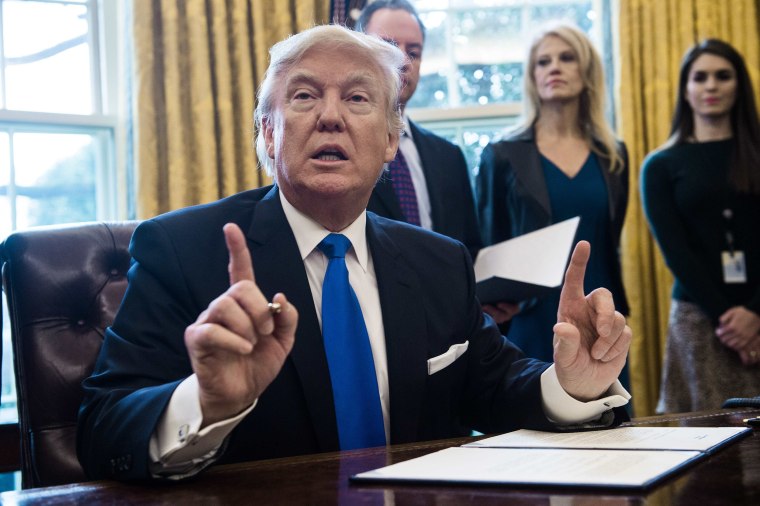Merriam-Webster defines "dictionary" as "a reference book listing alphabetically terms or names." But for President Donald Trump right now, the dictionary has become a sassy antagonist.
The one-hundred-and-sixty-some-year-old classroom fixture has been using Trump’s favorite social media platform, Twitter, to correct his spelling, remind his advisers what “facts” are, and highlight a zeitgeist in which “fascism” has become one of the lexicon's most searched entries.
Trump likes to brag that “I have the best words,” but the dictionary disagrees.
When Trump called Sen. Marco Rubio a "Leightweight chocker [sic]" on twitter last year, Merriam-Webster replied with the definition for "Nope."
When Trump misspelled unprecedented as "unpresidented," Merriam-Webster called him out.
When White House Counselor Kellyanne Conway defended "alternative facts," the dictionary reminded her there is so such thing.
And when Trump reportedly had a cheering section for his speech Saturday to the CIA, the dictionary helpfully noted that a "claqueur" is someone paid to applause.
It's maybe not the most groundbreaking satire, but Merriam-Webster's Twitter account has broken through because of its authority and because people enjoy seeing public figures called out.
In era of when trust in government and the media are near all-time lows, the dictionary is one of the few remaining arbiters of truth. And, as Betty White has often showed, it's fun to watch a stuffy old authority figure act out in a silly modern way.
Lauren Naturale, the dictionary's Content and Social Media Manager told NBC News that the “response was overwhelmingly positive" to the tweets, adding they are "among the most viral tweets we’ve ever had."
"A number of people actually told us they were subscribing to our Unabridged dictionary, or getting our app, or running out to buy a physical book," Naturale said.
Indeed, the public reaction has been "big league," as the president might say.
(Or is it “bigly?” Merriam-Webster found "examples of big league as a figurative adjective from 1916. The adverbial use of big league favored by Trump is not often encountered, however.")
Related: In Trump’s Twitter Presidency, Experts See Risks and Rewards
The dictionary saw its Twitter followers surge to more than 260,000 during last year's election. And while it never engages directly with Trump or his aides, Merriam-Webster's cheeky subtweets regularly get tens of thousands of shares and attention from mainstream media outlets.
(Urban Dictionary — somewhat of an unruly cousin — defines "subtweet" as “talking about someone behind their back but sort of in their face on Twitter.” Merriam-Webster doesn't have a definition for the slang term, yet.)
Dictionaries were early adopters of the Internet in the 1990s, recognizing its utility as a teaching tool. And Merriam-Webster, which traces its roots to Colonial-era American lexicographer Noah Webster, and has been reporting on trending words since 2010.
"Reporting on lookup trends completes the circle of telling the truth about words for us, because we have always used evidence of a word’s use in order to write definitions,” said Peter Sokolowski, editor-at-large for Merriam-Webster. "We don’t comment on policy or politics, but when a public figure uses language in a remarkable way that makes the news, it’s fair game for us."
Related: Poll: Nearly 70 Percent of Americans Give a Thumbs Down to Trump’s Twitter Habit
Merriam-Webster’s 2016 word of the year was "surreal."
Language has always been political, and it's possible the dictionary could join other elite institutions if Trump fans begin to see its definitions as compromised. George Orwell, another classroom favorite, whose "1984" has suddenly become a bestseller, described the "special connection between politics and the debasement of language.”
But Lisa Schneider, Merriam-Webster's chief digital officer and publisher, said the nearly two-century-old catalog of words has to stay relevant. When she joined the company three years ago, its social media presence was exactly what you would expect, she said, "entirely staid and predictable."
"Yet I was working with some of the smartest, funniest people I ever had the privilege to meet, and every time I told someone I worked for the dictionary they said, 'That’s so cool.' So here was this cool brand with smart, sassy conversations and comebacks happening in the office every day," she said, explaining she wanted to bring that to the world.
"I convinced my boss at the time to let me hire someone to execute that strategy, and here we are," she said.
So far so good, and the account is up for a Shorty Award this year, which recognizes social media success.
But the one person who hasn't responded yet is Trump himself. "No, we haven’t heard from the White House," said Naturale, who authors many of the tweets. "Presumably they have other things to think about."

